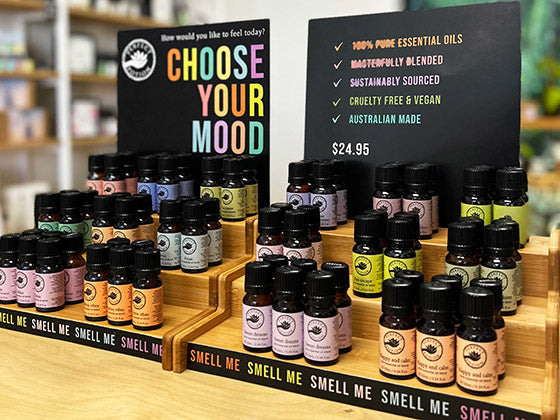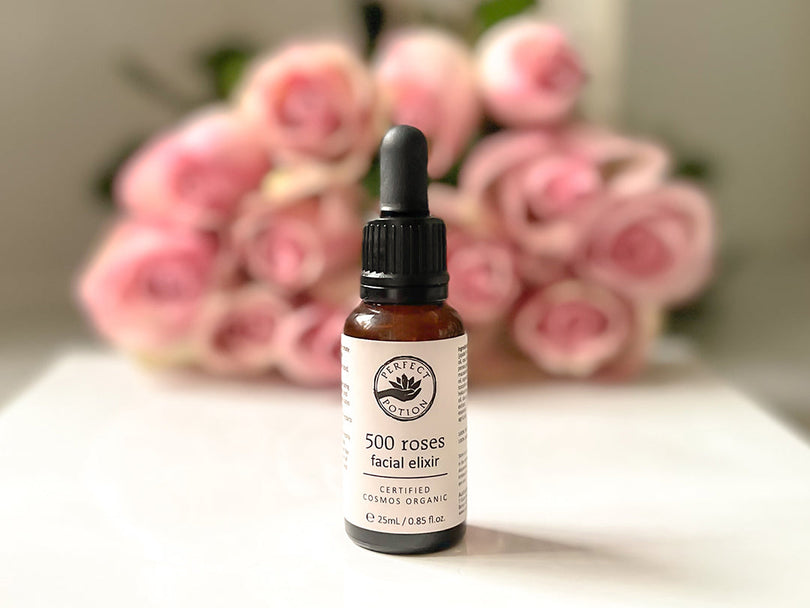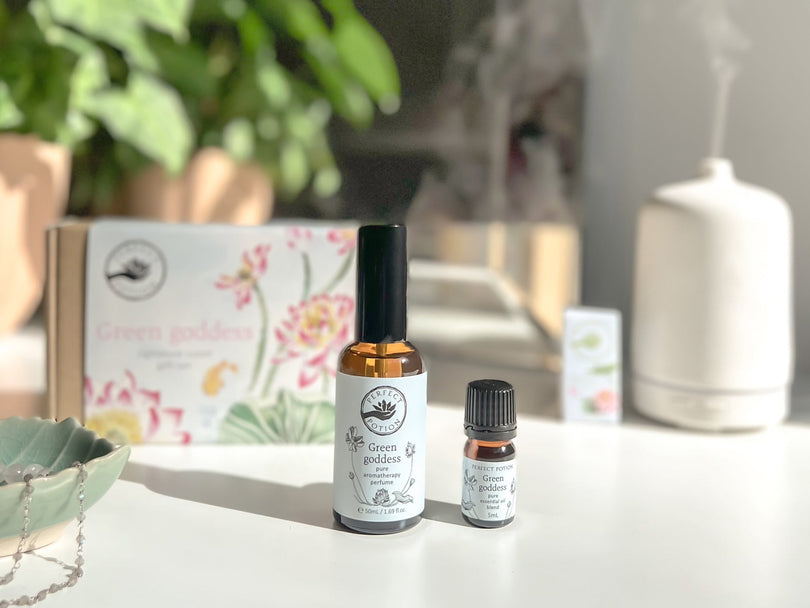This beautiful collection of essential oils epitomises the scent of the Japanese forest.
The kit contains four quintessential Japanese essential oils: hinoki leaf, hinoki wood,
sugi wood and sugi leaf. These oils are the classic Japanese aromas of shinrin-yoku,
the practice of ‘forest bathing’.
As you inhale these essential oils, imagine walking through a forest. Feel the earth
and leaves under your feet, listen to the birds singing, look up and notice how the
sun trickles through the tree canopy. You are feeling the effects of forest bathing.
Please enjoy creating your own forest sanctuary with pure essential oils of the forest.


Many cultures have long been aware of the unique relationship we have with nature.
In Japanese, shinrin-yoku is defined as ‘forest bathing’ or ‘taking in the forest atmosphere’.1
Shinrin-yoku means bathing in the forest atmosphere, or taking in the forest through all our senses; however, it does not imply exercising, hiking or jogging in the forest; it simply means being in nature and connecting with it with all our senses.2
Not knowing the name of the tree, I stood in the flood of its sweet scent.
Matsuo Bashō
While the term shinrin-yoku was only coined in 1982 by Tomohide Akiyama, Director of the Japanese Forestry Agency, the effects of forest bathing were well known by Matsuo Basho, one of Japan’s most renowned Haiku poets from the seventeenth century.
When the phrase was first coined, the idea was more of a marketing exercise to get people out of the city and to spend more time in nature in the forests.3
Around the world, shinrin-yoku is receiving increased attention for its capacity to promote relaxation and reduce stress. Research has identified many physiological and psychological benefits from exposure to the forest or elements of the forest.6
The benefits of shinrin-yoku
Many Japanese studies have reported spending time in the forest provides better emotional, physiological and restorative effects. These Japanese studies influenced further research in Korea, China, and Europe.4
Some of the positive health outcomes from forest bathing include lowered blood pressure, reduced muscle tension, increased brain wave activity in the alpha frequency, stabilising autonomic nervous system activity, reduced saliva cortisol levels, and decreased urine adrenaline and noradrenaline concentrations in both male and female subjects. 1,2,4,5
Shinrin-yoku also demonstrated a positive impact on cognitive function, immune function, blood glucose levels in diabetic patients, cardiovascular disease, cancer and pain. Research has reported potential benefits in the management of psychological symptoms including anxiety, depression, mood disorder, burnout syndrome, lifestyle stress and an overall improvement in the quality of life.4
READ OUR BLOG ON SHINRIN - YOKU & AROMATHERAPY
SHOP LIMITED EDITION SHINRON - YOKU EO COLLECTION

Essential oils are one of the easiest and most effective and safe ways to bring the benefits of the forest into your home. To create your shinrin-yoku experience you can:
- Place up to six drops of your chosen essential oil into your diffuser. For advice on blends please refer to forest bathing blends section of this booklet.
- Add 10 drops of essential oils to 20 drops of essential oil solubilizer in a spray bottle, then add water. This can then be used to mist your home.
- Add 5 drops of essential oil to 10 ml of carrier oil such as sweet almond oil and use as a massage oil.
- Add a few drops of essential oil to a warm bath.
 |
 |
Botany and originsHinoki oil is commonly derived from the wood, however an essential oil from the needles is also available.
|
Botany and originsAlso called Japanese cedar or Japanese red cedar, sugi is an evergreen tree that grows to a height of 35-60m and can attain a trunk diameter up to 4m. |
AromaThe scent of hinoki wood is dry, fine, woody note with a light terpene-like nuance and a warm, sweet, somewhat spicy undertone. The scent of hinoki leaf oil is intensely fresh, camphoraceous, pine-like aroma with a slightly green note. |
AromaThe scent of sugi wood essential oil has a soft delicate, woody note with a sweet-resiny woody undertone. The scent of sugi leaf essential oil has a fresh, pine-like aroma with a light, warm terpene-like note.
|
Uses and benefitsThe refreshing woody scent of hinoki wood oil suggests that it is beneficial to promote a calming and relaxing ambiance that is inducive to spiritual awareness. Hinoki wood oil is commonly used in Japan as an air purifier. Studies have confirmed that the oil may also be effectively used as a natural insect repellent. The refreshing, uplifting scent of hinoki leaf essential oil is mentally and emotionally uplifting and invigorating. Both hinoki wood and leaf essential oils have traditionally been used to alleviate respiratory congestion associated with blocked sinuses and chest congestion. |
Uses and benefitsThe subtle woody scent of sugi wood oil suggests that it is beneficial to promote a calming and relaxing ambiance that is inducive to spiritual awareness. Sugi wood oil is commonly used in Japan as an air purifier. The refreshing uplifting scent of sugi leaf essential oil is mentally and emotionally uplifting and invigorating. Both sugi wood and leaf essential oils have traditionally been used to alleviate respiratory congestion associated with blocked sinuses and chest congestion.
|
BlendingConsider blending hinoki wood oil with bergamot, Atlas cedarwood, cistus, clary sage, cypress, blue mallee eucalyptus, fir, frankincense, ginger, hiba wood, hinoki leaf, lavender, lemon, mandarin, neroli, sweet orange, pine, rosemary, Santalum spicatum, black spruce, vetiver or ylang ylang. Consider blending hinoki leaf oil with basil, bergamot, blue mallee eucalyptus, fragonia, fir, frankincense, ginger, hiba wood, kunzea, hinoki wood, lavender, lemon, lemon myrtle, peppermint, pine, rosemary, black spruce, sugi leaf, sugi wood, tea tree or vetiver. |
BlendingConsider blending sugi wood oil with bergamot, Atlas cedarwood, cistus, clary sage, cypress, blue mallee eucalyptus, fir, frankincense, ginger, hiba wood, hinoki wood, hinoki leaf, lavender, lemon, mandarin, neroli, sweet orange, pine, rosemary, Santalum spicatum, black spruce, sugi leaf, vetiver or ylang ylang. Consider blending sugi leaf oil with basil, bergamot, blue mallee eucalyptus, fragonia, fir, frankincense, ginger, hiba wood, kunzea, hinoki wood, hinoki leaf, lavender, lemon, lemon myrtle, peppermint, pine, rosemary, black spruce, sugi wood, tea tree or vetiver. |
Forest Bathing Blends
Bring the benefits of shinrin-yoku into your home with these blends utilising these four beautiful Japanese essential oils.
Blend recipes synergised by aromatherapist Salvatore Battaglia.

Salvatore Battaglia
Aromatherapist • Educator • Author • Perfect Potion Founder & Director
Global Leading Expert in Aromatherapy for 30+ Years
 |
Salvatore Battaglia is a globally renowned aromatherapist and educator, frequently called upon as an expert to speak at international conferences. He is the author of numerous best-selling evidence-based aromatherapy texts, including The Complete Guide to Aromatherapy I & III, which are used as study material for numerous aromatherapy schools, as well as creating masterclasses and webinars for the Perfect Potion education platform.Salvatore is also the master blender at Perfect Potion, creating aromatic synergies of nuance and complexity that are entirely matchless in scent and sophistication. |
References
- Li Q. Effect of forest bathing trips on human immune function. Environmental Health and Preventive Medicine, 2010; 15(1): 9-17. doi: 10.1007/s12199-008-0068-3
- Li Q. Forest bathing – how trees can help you find health and happiness. Viking, New York, 2018.
- Miyazaki Y. Shinrin-yoku – the Japanese way of forest bathing for health and relaxation. Aster, London, 2018.
- Oh B et al. Health and well-being benefits of spending time in forests: Systematic review. Environmental Health and Preventative Medicine, 2017; 22(1) :71. doi: 10.1186/s1199-017-0677-9
- Takayama N et al. Emotional, restorative and vitalizing effects of forest and urban environments at four sites in Japan. International Journal of Environmental Research and Public Health, 2014; 11(7): 7207-7230. doi: 10.3390/ijerph110707207
- Tsunetsugu Y et al. Trends in research related to ‘shinrin-yoku’ (taking in the forest atmosphere or forest bathing) in Japan. Environmental Health and Preventive Medicine, 2010; 15(1): 27-37. doi: 10.1007/s12199-009-0091-z





